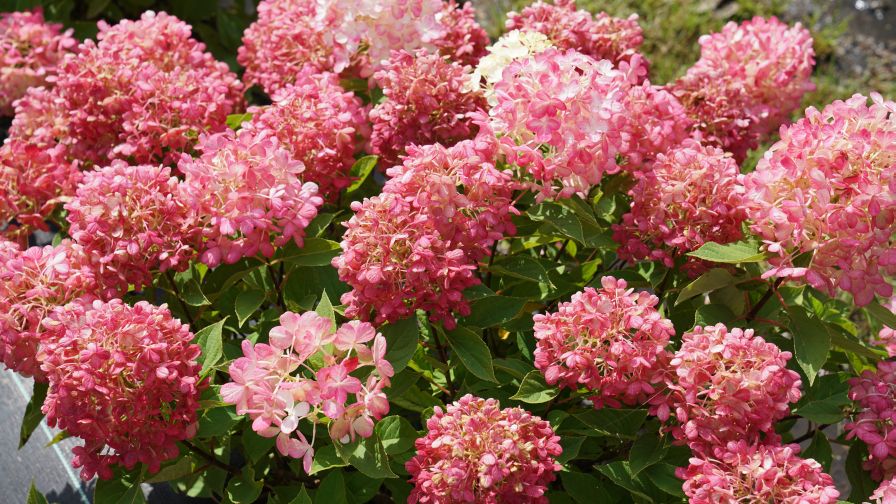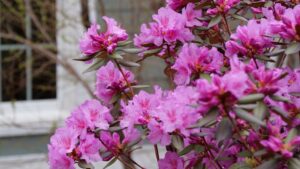Proven Winners ColorChoice Cultivars Earn High Marks

Hydrangea paniculata Fire Light Tidbit (Spring Meadow, Proven Winners ColorChoice Shrubs)
The Chicago Botanic Garden completed a 20-year staggered trial of Hydrangea paniculata cultivars in October 2019, and the program has compiled and released Plant Evaluation Notes, issue #47, with observations and results.
Over the course of the trial, hydrangeas were evaluated for a minimum of six years and regularly assessed for their adaptability to the soil and environmental conditions; disease and pest issues; winter hardiness and survivability; and ornamental qualities.
Of the 45 Hydrangea paniculata cultivars evaluated, eight earned a 5-star (Excellent) rating, half of which were Proven Winners ColorChoice cultivars. Those top-performing panicle hydrangeas included: ‘Limelight,’ ‘Little Quick Fire’, ‘Little Lime’, and ‘Pinky Winky’.
The remainder of the Proven Winners ColorChoice panicle hydrangeas that were included in the trials also fared very well with 4-star ratings.
“The goal of the program is to determine, through scientific evaluation, which plants are superior for gardens in the Upper Midwest” according to the Chicago Botanic Garden’s website. “Plants are rated on ornamental qualities, cultural adaptability, winter hardiness, and disease and pest resistance. It is the intent of the program to study and recommend plants that are readily available in area nurseries.”
The seven Proven Winners ColorChoice panicle hydrangeas that were included in the program are available by contacting an account manager from Spring Meadow Nursery, or a local wholesaler.
More information about the Chicago Botanic Garden can be found here.

Rhododendron Black Hat (Spring Meadow, Proven Winners ColorChoice Shrubs)
Proven Winners ColorChoice Cultivars Named Rhododendron of the Year
The American Rhododendron Society has released the results of its 2022 Rhododendron of the Year Awards and two Proven Winners ColorChoice cultivars earned regional awards.
The committee selects rhododendrons for adaptability in eight regions of the U.S. and Canada. The site states, “To be selected for a Rhododendron of the Year award, a plant must have excellent foliage and flowers, have an attractive plant habit, be pest and disease resistant, and be cold hardy for the region.”
Proven Winners ColorChoice ‘Black Hat’ and ‘Dandy Man Color Wheel’ rhododendrons were named Rhododendron of the Year for the South Central region. For each region, the Plant Award Committee chooses an elepidote and a lepidote rhododendron, a deciduous azalea, and an evergreen azalea.
‘Black Hat’ rhododendron is a lepidote species, generally noted for small foliage with scale-like structures on the undersides of the leaves. Bred by Dr. Tom Ranney at North Carolina State University (NCSU), Black Hat rhododendron is a triploid, making the flowers longer lasting than conventional selections. This rhododendron has thick, dark, evergreen foliage that takes on dramatic purple-black tones in cool weather.
Also bred by Dr. Ranney, ‘Dandy Man Color Wheel rhododendron is elepidote, with the large leaf size that typically comes to mind when referencing rhododendrons. They are called elepidote because they lack the scale-like structures on the undersides of the leaves. Dandy Man Color Wheel rhododendron has ruffled pink blooms that transition to crisp white, creating the effect of three different colors blooming at once. Handsome evergreen foliage, excellent disease resistance, and heat tolerance make this NCSU hybrid an adaptable, widely usable broadleaf evergreen.
The American Rhododendron Society is a non-profit organization designed to encourage interest in and provide information about the genus rhododendron. Society activities include public education, plant sales, flower shows, seed exchanges, and scientific research.









